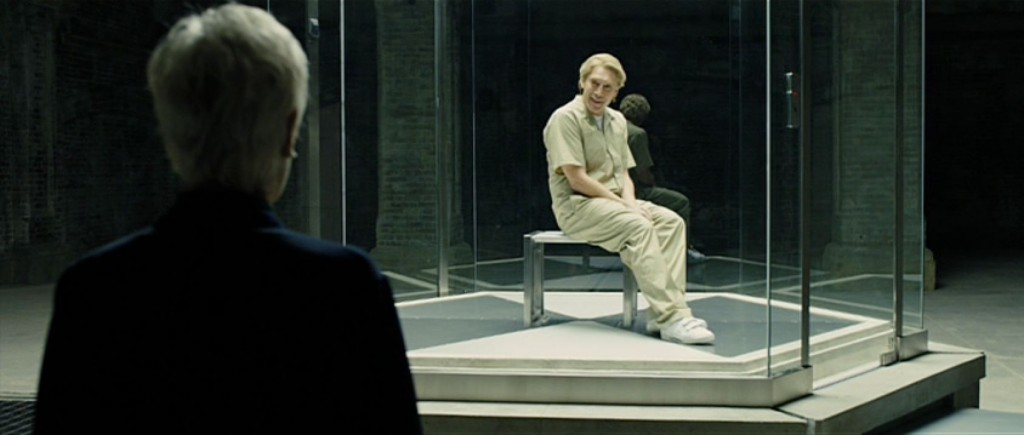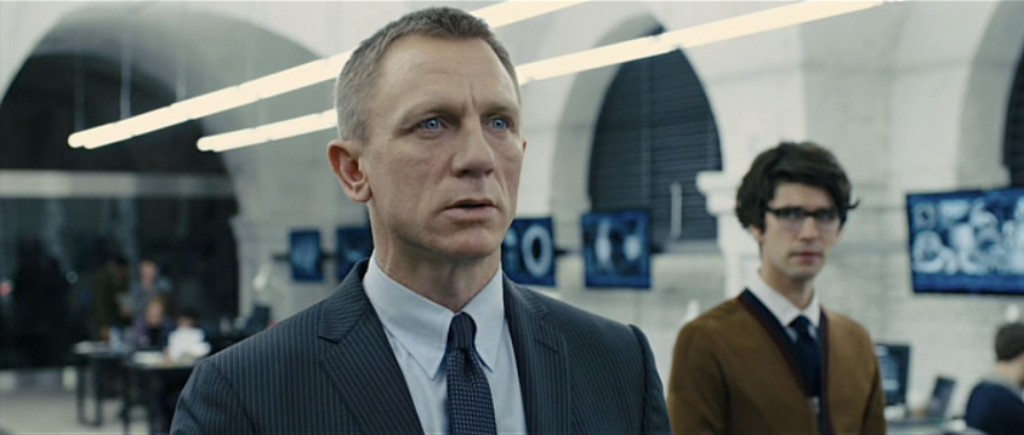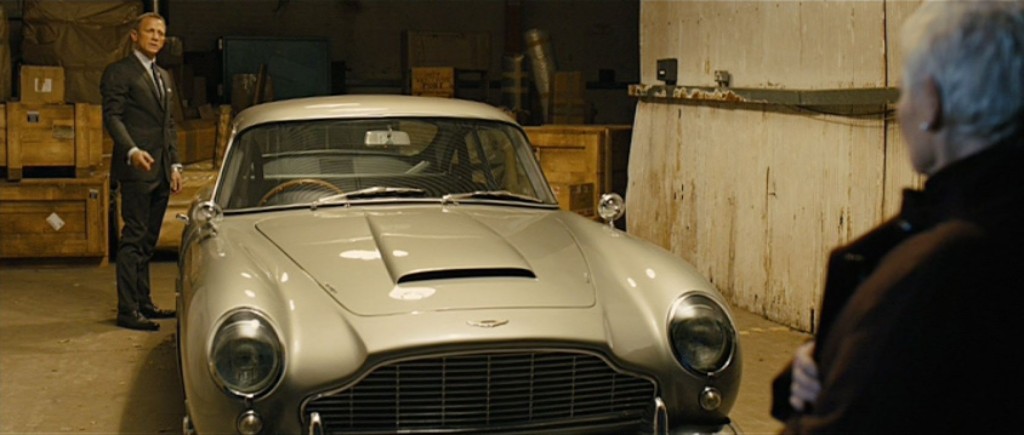James Bond: Skyfall part 7
Skyfall, up to this point, has been eerily linked to The Dark Knight Rises in many ways, but now suddenly it links itself to The Avengers, or, rather, to Silence of the Lambs, with Silva brought to justice mid-movie and placed in what can only be an escape-proof glass cage. (How odd that MI6, just recently relocated, nevertheless had the foresight to build an escape-proof glass cage in their offices.) The glass cage, because of its cinematic echoes, dramatically ramps up our fear of Silva — up ’til now his threat has always been cyber-specific, but suddenly he’s being treated like a dangerous animal, as though he might bite. (Ironic that his Bond-villain deformity is a damaged jaw.)
“You’re smaller than I remember!” beams Silva as M comes to visit him, exactly what a son returned home from a long absence says to his mother. Silva wants to press the mommy button, but M counters brilliantly with “Whereas I don’t remember you at all.” Silva, he reports, was left for dead with some enemy spies who tortured him for months (shades of Die Another Day) and his only recourse was his cyanide tooth, which — damn British manufacturing! — was defective and only disfigured him. Silva’s egotism is directly related to his hatred of M, in the way of growing boys everywhere: he seeks, in his own way, to cut the apron strings, to wipe his mother off the earth so that he can finally be his own man.
M gets Bond alone and tattles on Silva. The upshot is, Silva pretends to be a good son betrayed, but in fact he was a bad son — he exploited his freedom as a secret agent and went into business for himself. She gave him up to the Chinese and got six imprisoned agents free, and “a peaceful transition” (this is 1997 I assume we’re talking about). The numbers don’t lie, but Silva’s ego doesn’t allow him to see the balance sheet. Like Hamlet, he’s been wronged and now everyone must pay. The best way to examine Silva’s logic is to look at what Bond does when similarly betrayed by M and left for dead: he vanishes, retires to an exotic location, and sets about sexing up ladies, popping pills, drinking and gambling — his status quo. He doesn’t trade on his secret-agent status, he doesn’t go into business for himself (except to pay rent on his beach shack and his pills, I guess) he doesn’t hire himself out as an assassin. He instead runs home to M when she is imperiled — a wayward son, enjoying a moment of adolescence before returning to the family manse to take up the mantle of responsibility.
(When the analyst says “Country” and Bond says “England” instead of “Scotland,” he’s thinking of England in the form of M — his duty.)
Not wasting a moment, the narrative moves into a terrific three-pronged extended suspense sequence — while Bond and Q decrypt Silva’s computer, M testifies to a commitee featuring both Voldemort and Mrs. Malfoy, and Silva prepares to escape. We know he’s going to escape from his escape-proof glass cage, we’ve seen both Silence and The Avengers, but we don’t know how but the look on Silva’s face tells us it’s going to be good.
The three prongs of the sequence weave together nicely — not the easiest trick in the book, especially for a Bond screenplay. Bond and Q decrypting Silva’s computer is the very thing that allows Silva to escape (computers — they can do anything!) allowing him to dash to M’s hearing, chased by Bond, to attempt to kill M. (The “I can rule the world with a computer” plan was also used by Moriarty on Sherlock last season — and then tossed aside as being too silly. Still, it’s more plausible than, say, Blofeld’s plan to destroy the world by kidnapping astronauts.) Bond gives chase, through subterranean London (echoing The Dark Knight Rises again), (and, Bond leaps onto his second train in a single movie) leading Silva to drop a train on him. (I was watching both On Her Majesty’s Secret Service and You Only Live Twice recently, and I’m struck by how, as Bond as become more realistic, his surroundings have become less grand. No hollow volcano for Silva, no soaring Ken Adam sets, it’s as though Bond has suffered budget cuts along with everyone else. And yet Skyfall succeeds just fine as spectacle, taking Bond’s privations and making them visual — where he once would have the world at his doorstep, he now skulks through public works and abandoned islands.)
(And you know, there’s the old cliche, a cliche so bald that my children know it without ever seeing a Bond movie, the scene where Bond comes into the room and the desk chair swivels and there’s the bad guy with his cat and he says “I’ve been expecting you Mr. Bond.” The reason that moment is ridiculous is because it presumes that the bad guy had nothing else to do than to sit behind his desk, facing the wall, waiting for Bond to show up. That moment focuses the early Bond attitude to a pinpoint because it presumes that everything is there for Bond’s edification, that everyone is simply waiting around for Bond to show up so that they can fulfill their roles in his story. It’s not just chauvanist, it’s imperialist, to present an espionage narrative in that manner. That’s the key difference in the Craig reboot, they’ve made Bond an outsider, not the hero everyone is waiting for.)
The chase through the Underground nicely highlights the new Bond/Q dynamic. Q calls the shots from his command center, watching Bond on computer grids and CCTV, while Bond struggles with the physical difficulties at hand, the rusted doors and the crowded platforms. Q is not in his pajamas exactly, but his attitude is clear: he thinks of Bond as a kind of videogame avatar, and a glitchy one at that.
What’s happening at M’s hearing, of course, is the exclamation point on her whole crisis — the authorities think she is too “old fashioned” to be doing today’s espionage work, that her way of doing things is outmoded and irrelevant, right before Silva comes in to kill her. Ironically, the very moment that should prove M’s worth is the one that seals her fate — Bond rescues her and spirits her away, away from her trials and away from her bad son. She leaves her home, her office, her city and her nation, never to return.
This is Bond at his low point — Silva is free, M is in danger, any place with a computer is unsafe. The only thing he can do is to go home. Which he does, literally, by returning to Skyfall, his boyhood estate, and figuratively by — somehow — taking his 1965 Goldfinger Aston Martin, complete with machine guns and ejector seat, to get there.
Before the act ends, we check in with Q and Tanner again, who are laying a “trail of breadcrumbs” to lead Silva to Scotland. Mallory comes in, bandaged from the shootout, and Q and Tanner whinge like the headmaster has caught them. But Mallory, an old soldier himself (we still halfway expect him to turn out to be a bad guy at this point) surprisingly reveals himself to have changed during M’s trial. He’s no longer a young lion (well, middle-aged lion) looking to clean house, he’s learned that M knew best all along, that the world of Bond has always been one of shadows and double-blinds, and that Bond himself is his best bet for catching Silva, and, perhaps, M.
That ends Act III of Skyfall, a swift 25 minutes, again, cut into three sections, of quite unequal length: Silva in the glass box, which is one five-minute scene, Silva escaping, which is the three storylines entwined in the suspense sequence, and escape aftermath.



Silva’s description of what happened to him at the hands of the Chinese is one of the reasons why I had to watch and re-watch the title sequence for this movie, and led me to look at it as a dream symbol synopsis of the entire film, and one of the best Bond title sequences I’ve ever seen…because even Silva’s torture and transformation is there! Right after the Chinese dragons appear, and right before Adele launches into the bridge, there he is!
Speaking of The Dark Knight, Silva also contains echoes of The Joker, given the taunting, semi-comedic messages he leaves for M, his willingness to get captured as part of his plan and his tendency to smile a lot despite/because of the fact that he has a disfigured jaw. And your comparison with Moriarty from ‘Sherlock’ is a good one, since he allows himself to be captured as part of his plan as well. It’s like The Joker, Loki, the contemporary Moriarty and Silva are all based on the same template.
I love the fact that M quotes from Alfred, Lord Tennyson’s “Ulysses” as her seemingly defiant closing statement, partly simply because it embellishes the Bond film’s “Britishness” in an unusual, high-culture way, just as The Animals’ song that comes later does so in a “low” culture way. Usually the Britishness comes across in more familiar signifiers like Union Jack parachutes or Churchill bulldogs.
It’s an interesting choice of quote, since the context of the poem is that the aged Ulysses, of “The Odyssey” fame, still feels wanderlust after returning to his homeland, and is planning to embark on another voyage with his similarly elderly shipmates, from which they are unlikely to return. I note that M quotes this, then embarks on a trip with Bond, from which she never returns,
Also, because the film plays up the aging Bond’s vulnerability, the line “We are not now that strength which in old days / Moved earth and heaven,” it’s like she’s not only speaking for herself, she’s speaking for Bond. If memory serves me right, here’s the quote:
We are not now that strength which in old days
Moved earth and heaven, that which we are, we are,–
One equal temper of heroic hearts,
Made weak by time and fate, but strong in will
To strive, to seek, to find, and not to yield.
Except, in the context of retreating empire, yielding is exactly what M and the British government have been doing: yielding Hong Kong, yielding her top agent (both ordering the shot towards Bond and trading Silva to the Chinese).*
The further irony of “Ulysses” is that it’s about exploring and moving forward, when Bond and M’s trip is back home, to the motherland. (Much like Silva’s travel here is towards the Mother.) Perhaps Bond’s mention of “England” is both a characteristic denial of his past (no event ever left a mark on Bond until the Craig movies) and a denial of English empire.** But by the end, he’ll have to confront his past.
*For all the thematics of old (Bond) vs. new (Q), Silva straddles the divide: a computer hacker and a shooter, easily worth 6 regular agents/prisoners. (6? Isn’t that both the number of the department and the number of coffins M mourns over earlier…) Also,when I try to fill in the gap between “tortured Chinese prisoner” to “leader of a worldwide organization,” it just emphasizes Silva’s superior talents. Why did M ever give him up?
**Which brings us to Mallory, both for his past with another of Britain’s imperial adventures–captured and tortured by the IRA, he’s another mirror to Silva. (Wait, did we already mention that Silva’s real name is Tiago, which is a form of Santiago, which is a form of James? Just another link connecting Bond and Silva.) Like Silva, Mallory makes M’s life hard and attempts to erase her. But maybe with that Arthurian name (Malory, author of Le Morte d’Arthur), the movie is signaling that he’s a good king, not a bad son.
Why did M ever give him up?
Because he can’t be trusted. M said back in Casino Royale that she was contemplating throwing Bond to the dogs for the same reason. But his error was a one-off bad decision, whereas Silva had an ongoing pattern of untrustworthiness. No matter how effective he is, he isn’t a good agent if he makes a habit of freelancing in his own interests.
Thanks for plumbing the Tennyson quote. I knew it was important, I’m just not well-versed (sorry) enough to discuss it.
It was so refreshing to see a well-crafted, self-aware Bond flick. The sequence you explored here where M is being grilled was such a perfect meta-moment for the franchise. I’m very interested in your take on how the film answers the question in the closing act on how relevant the Bond franchise is at its 50 year mark.
The Aston Martin being complete with the machine-guns and ejector seat kind of bugged me, because it seemed to be the point where the facade was showing through.
Because CASINO ROYALE already did the nod: Reboot Bond wins a reboot Aston Martin. Because women want him, men want to be him, and Aston Martins just can’t stay away from the man! It’s like Roy Rogers and Trigger.
But this one, the GOLDFINGER Aston Martin, there’s just no reason for it to exist in this universe, it’s like it fell through a wormhole from an alternate universe.
Bond even seems to mention it’s not a “company car”, which makes it even stranger that it has machine-guns, and yet M seems to be aware of the ejector seat.
I could almost see it if they had the 1960s Aston Martin sans gadgets —- it’s an heirloom, owned by Bond’s father, or something, and Bond has had it in storage. We’d all get the wink wink nudge nudge.
Although you’d kind of think if Bond had a 1960s Aston Martin in storage in London, even his taciturn self in CASINO ROYALE would say, “Man, this is SO WEIRD I just won this new Aston Martin in a poker game — I’ve now got two of the damn things!”
I mean, even when he’s getting his balls whipped by Le Cipher, it’d be hard to resist saying —- “Hey, I know you’re whipping my balls and everything, but I gotta tell you this — you know that Aston Martin you just made me wreck? This is SO WEIRD — I’ve got ANOTHER ASTON MARTIN IN STORAGE BACK HOME IN LONDON! Sorry, I just had to tell somebody that…”
As as aside, they’ve been doing a weird thing in the Bond video games —- a remake of Goldeneye recast the Daniel Craig Bond, and in the recent 007 LEGENDS video game, Daniel Craig appeared in GOLDFINGER (With a Pussy Galore who was very Honor Blackman!), ON HER MAJESTY’S SECRET SERVICE, MOONRAKER, LICENSE TO KILL, and DIE ANOTHER DAY.
But not really — they’re all very updated to 21st century, so fairly far removed from the movies, with scenes and levels that weren’t in the movies. So this Bond has had similar adventures, but not quite identical to his predecessors.